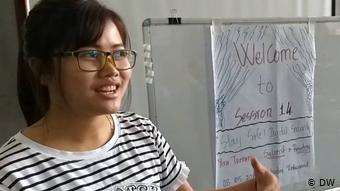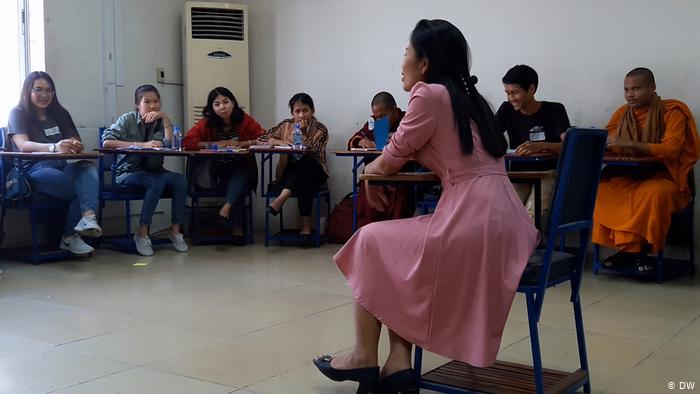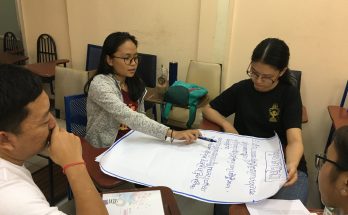University students at two Cambodian universities attend the “Media 101” club in their spare time. The club aims to help students use media to participate in the public dialogue in a safe and respectful way.
A group of students sits in a circle in a classroom at Phnom Penh’s Paññāsāstra University of Cambodia (PUC). The COVID-19 pandemic hasn’t yet hit Cambodia and there are no restrictions on the number of people who can meet. One young woman sits in the middle of the room and tells the others an anecdote from her life. But did the event really happen or is she making it up? When she finishes speaking, the other students are allowed three follow-up questions to verify whether the story is true. Then they have to decide and hold up a blue card if they think the anecdote is true or a red card if they believe it’s a lie. In the end, everyone has a good laugh when they discover that many of them have fallen for a tall tale because it was delivered so convincingly.
This interactive game opens a session on verifying information on social media in the “Media 101” club, a platform which have been established at both PUC and the University of Puthisastra (UP). The aim is to introduce first-year students to a variety of topics related to media and help them use media to participate in the public dialogue in a safe and respectful way. Since the clubs were launched in early 2019, almost 100 students have completed the 24-session curriculum.
Making learning fun

For most of the students, the experience that learning can be fun is new. One of them is Heng Rachana, a major in international relations at PUC who graduated from the MIL Club last year. She says it was games like the one described above that kicked off each MIL Club session that she enjoyed most. They helped her get into the topic of the day in a playful way.
In the MIL clubs, students always play an active part. They don’t sit passively while someone delivers a lecture. Instead, they share and discuss their own media experiences and delve into specific media topics in group work segments. Media productions are also a key element of every session. The students create photo stories, design their own ad campaigns or produce videos using their smartphones.
“I think the best thing ever about the MIL Club is the training technique,” said Hout Salinit, who has been one of the MIL club trainers since June 2019. “I have attended many trainings and I can see the differences between the MIL Club and other trainings.”
Apart from these creative and interactive methods, one of the key differences between the MIL Clubs and other educational formats is that the trainers are only a little older than the participants. So it’s peer-to-peer training, not top-down.
“The club gives everyone a comfortable learning environment, meaning that they feel free to ask questions, discuss topics and share their thoughts. It encourages everyone to fully participate,” explained Hout Salinit.
Engaging topics key to participation
Students attend the MIL club sessions in their free time. So the topics must be relevant to their lives and the sessions have to be fun. Otherwise, club members would lose their motivation to attend the weekly meetings. The curriculum covers traditional as well as social media. Many of the MIL club sessions focus on social media issues, because digital media like Facebook are the prime source of information for most students in Cambodia. There are sessions about disinformation and verification, digital safety and security, cyber-bullying and sexting, and protecting your privacy on social media.
MIL keeps students safe
International observers have noted a deterioration in freedom of expression in Cambodia over the past several months. Authorities have increasingly detained citizens for sharing or posting things on social media platforms like Facebook which allegedly could cause “incitement” or “chaos”.
“Using it in a wrong way is pretty dangerous for every user,” said MIL Club member Chhouk Chanthida. “That’s why media and information literacy plays an important role for Cambodian youths.
MIL Club trainer Sek Sophal echoes this sentiment. “In the digitally connected world, information can be disseminated at the speed of light. Speedy communication comes with risks, such as misinformation, hate speech and political polarization. With MIL skills, young people in Cambodia can take advantage of social media for their studies, work and business, and use them in a safe and responsible way.”
COVID-19 creates barries to learning
DW Akademie experts helped train the 10 Cambodian MIL club trainers, most of whom are affiliated with DW Akademie’s local partner, the Cambodian Center for Independent Media (CCIM). Together, they developed the framework and the curriculum of the MIL Clubs, and adapted the session plans and training methods when COVID-19 struck Face-to-face trainings were no longer possible because the government closed schools and universities to prevent the spread of the virus.
Holding the MIL club meetings online worked to some extent, but it was more challenging and less fun for trainers and participants. Everyone missed the direct interaction. In addition, some of the students were back in their remote hometowns, where their internet connections were shaky. The only device they had to join the sessions was their smartphone, which made it difficult for them to switch between training platforms like Zoom, Padlet, or Slido.
“I think we did not interact as much when we were running on Zoom,” said trainer Sek Sophal. “But having to work online allowed us to experience new technologies specifically designed for online training and workshops.”
Just like all the other trainers and MIL Club members, Sek Sophal hopes that the club sessions can move back into the classrooms soon. Then, the plan is to offer advanced MIL Club sessions for alumni and to open up new “Media 101” clubs at universities in provinces outside the capital Phnom Penh.
This article is written by Thorsten Karg, trainer and project manager at DW Akademie, and originally published on DWA website



